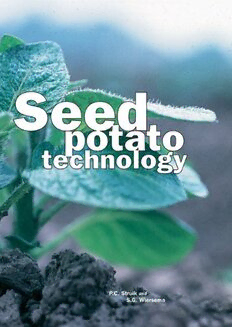
Seed Potato Technology PDF
Preview Seed Potato Technology
P.C. Struik and S.G. Wiersema Seed potato technology Seed potato technology P.C. Struik and S.G. Wiersema Wageningen Academic P u b l i s h e r s Buy a print copy of this book at www.WageningenAcademic.com/seedpotato This work is subject to copyright. All rights are reserved, whether the whole or part of the material is concerned. Nothing from this publication may be translated, reproduced, stored in a computerised system or published in any form or in any manner, including electronic, mechanical, reprographic or photographic, without prior written permission from the publisher: Wageningen Academic Publishers P.O. Box 220 6700 AE Wageningen The Netherlands ISBN: 978-90-74134-65-1 www.WageningenAcademic.com e-ISBN: 978-90-8686-759-2 [email protected] DOI: 10.3921/978-90-8686-759-2 The content of this publication and any liabilities arising from it remain the First published, 1999 responsibility of the authors. Reprint, 2012 The publisher is not responsible for possible damages, which could be a © Wageningen Academic Publishers result of content derived from this The Netherlands, 2012 publication. Preface The potato is one of the most important food crops in the world. This statement can be illustrated by the following facts. First of all, the potato crop is grown on a significant scale in more than 130 countries. Secondly, potato tubers are consumed by one billion people worldwide. Finally, one third of the total world production originates from developing countries. Being a (mainly) vegetatively propagated crop, many of the numerous diseases and pests that affect the potato crop worldwide, are transferred from one generation to the next or may even accumulate in the seed and thereby spread. This makes seed tuber health an important issue. Seed tubers also respond to the abiotic conditions during their production and storage. These conditions determine the useable seed yield. But the effects of these conditions are also reflected in the physiological quality of the seed tubers, as expressed in their ability to produce a vigorous crop. Both quality aspects are crucial factors in the productivity of the crop originating from the seed tubers. Quality does not come cheaply. Cost of high-quality seed tubers continues to be a major cost factor in potato production, especially in developing countries, because they are bulky and the rate of multiplication is low. Especially in the Third World, potato is grown in many different environments and cultivars must be highly adapted to perform well. Good seed technology and distribution systems are therefore essential for the introduction and maintenance of local cultivars. Developments in the potato industry have been rapid during the last 50 years, especially with respect to the production of pre-basic and basic seed, and systems of multiplication. Well- functioning formal seed systems have been established in many countries all over the world. Production of in vitro plantlets, microtubers and minitubers have become technologies that are widely available and adaptable to local needs and possibilities. True potato seed technology has become a low cost alternative to the seed tuber technology and this true potato seed technology is used to produce healthy starting material in an increasing number of countries. Studies on seed supply systems have shown that informal seed systems based on traditional seed flows also have potential for improving seed quality, particularly through the application of appropriate seed technology and interaction with formal seed programmes. Given these revolutionary developments, this book that reviews the current state of the art of the knowledge and technologies relating to seed production technology in all its stages is timely and fulfils a widely felt need. The authors of the book are well-known experts in the field of potato science. They have used their long-term experience as potato researchers, as lecturers in the International Potato Courses in Wageningen and at potato courses of various agricultural universities, and their wide networks in international potato science and practice, to transform the complex and fragmented information into a book that is of interest to all who are interested in this fascinating vegetatively propagated food crop. Dr Hubert Zandstra Director-General of the International Potato Center, CIP, Lima, Peru Seed potato technology 7 Acknowledgements The production of this book would never have started without the preliminary work carried out by Ir. Remco Roeland. He compiled a lot of valuable information and drafted several incipient chapters. The authors very much appreciate his valuable contribution to this book. The authors want to express their gratitude to the referees for their diligence and unselfish work. They have provided valuable comments on drafts of the separate chapters or reviewed the entire book. By listing them we want to acknowledge that this book greatly gained by their efforts. The referees and reviewers were: C.J.M. Almekinders H.P. Beukema D.O. Caldiz A. Devaux H. van de Haar P.M. Harris A.J. Haverkort J.G.T. Hermsen R.C.B. Hutten M.K. van Ittersum A.F.M. Jacobs P.M. Kerkhoven P.L. Kooman T.J. Kuipers W.J.M. Lommen C.D. van Loon J.P. van Loon W. Reust P. Schmiediche K. Scholte M. Upadhya H. Zandstra E. Zimnoch-Guzowska The English text was corrected by Sarah van Otterloo-Butler. This book would also not have been written without the confidence and continuous support of the Publisher. The co-operation with Wageningen Pers has been pleasant and fruitful. Especially the interaction with Mr Mike Jacobs contributed considerably to the joy with which we have worked on the manuscript of this book. The authors Seed potato technology 9
